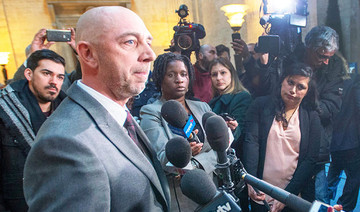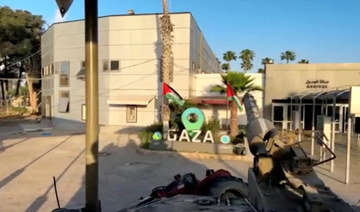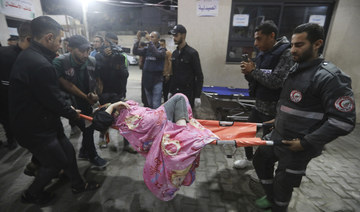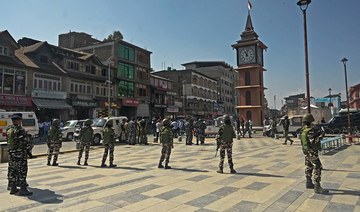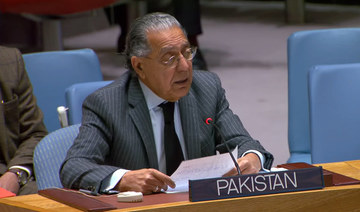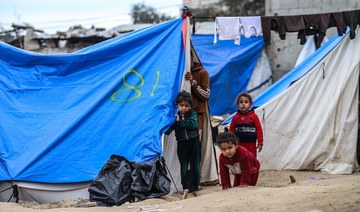TORONTO: A leading Cabinet minister in Canadian Prime Minister Justin Trudeau’s government resigned Monday, becoming the second minister to step down over a scandal that has shaken the government in an election year.
Treasury Board president Jane Philpott, considered a star minister, said in a resignation letter that it was “untenable” for her to continue in the Cabinet because she lost confidence and could not defend the government.
Philpott’s friend, former Attorney General and Justice Minister Jody Wilson-Raybould, testified last week that Trudeau and senior members of his government inappropriately tried to pressure her to avoid prosecution of a major Canadian engineering company in a case involving allegations of corruption in Libya.
Wilson-Raybould resigned from Cabinet last month after being demoted to veteran affairs minister the month before.
The scandal has rocked Trudeau’s government. Gerald Butts, his closet adviser and best friend, also resigned last month and is scheduled to testify Wednesday before a Parliament justice committee in Trudeau’s defense.
“I know Philpott has felt this way for some time. And while I am disappointed, I understand her decision to step down. I want to thank her for her service,” Trudeau said at a campaign-style event.
Trudeau said he takes the concerns very seriously and said the matter has generated an important discussion.
“But at the same time, we need to keep in mind the bigger picture,” Trudeau said.
Trudeau has acknowledged raising the issue with Wilson-Raybould, but has said that was appropriate.
“I have concluded that I must resign as a member of Cabinet,” Philpott wrote. “Sadly, I have lost confidence in how the government has dealt with this matter and in how it has responded to the issues raised.”
Philpott, a physician, is a former minister of health and minister of indigenous services and was widely viewed as of one of Trudeau’s most competent Cabinet ministers.
“The evidence of efforts by politicians and/or officials to pressure the former Attorney General to intervene in the criminal case involving SNC-Lavalin, and the evidence as to the content of those efforts have raised serious concerns for me,” Philpott wrote.
“I must abide by my core values, my ethical responsibilities and constitutional obligations. There can be a cost to acting on one’s principles, but there is a bigger cost to abandoning them.”
Philpott said she would continue as a Parliament member for Trudeau’s Liberal Party.
Wilson-Raybould said the same last week but declined to say she had confidence in Trudeau. Trudeau said earlier Monday he was still deciding whether Wilson-Raybould could remain a member of his party in Parliament.
Trudeau thanked Philpott for her service in a short statement that said he would have more to say later in Toronto.
The leader of the opposition Conservative Party, Andrew Scheer, said at a news conference that Philpott’s resignation demonstrates “a government in total chaos” and called again for Trudeau to resign and for a police investigation of the affair.
Wilson-Raybould testified last week she was pressured to instruct the director of public prosecutions to negotiate a remediation agreement with SNC-Lavalin. The agreement would have allowed the company to pay reparations but avoid a criminal trial on charges of corruption and bribery. But Wilson-Raybould said the pressure was not illegal and said she was not instructed to interfere.
If convicted criminally, the Montreal-based company would be banned from receiving any federal government business for a decade. SNC-Lavalin is an economic force in Canada, with 9,000 employees in the country and about 50,000 worldwide.
“This is a spectacular blow to the government” said Nelson Wiseman, a political science professor at the University of Toronto. “It has become rare that ministers resign on principle in Canada. And now we’ve had two in such a short time. It reveals deep division in the Cabinet about how to deal with Jody Wilson-Raybould.”
He said he thinks that most ministers and Liberal lawmakers want to kick her out of the party and that Philpott does not agree with them.
Wiseman said the last time he can recall something like this was in 1963 when three Cabinet ministers resigned over then Prime Minister John Diefenbaker’s opposition to the stationing of American nuclear weapons on Canadian soil.
“This blow won’t bring down the government, and Trudeau, like Diefenbaker, will survive and fight back,” Wiseman said.
Robert Bothwell, a professor at the University of Toronto, said the resignations speak to Trudeau’s failure to connect with his own troops.
“His failure to give a vigorous but reasoned response at the beginning of this pseudo-scandal allowed it to grow into Godzilla,” Bothwell said.
Bothwell said Trudeau is not like his father, the late Prime Minister Pierre Trudeau, who swept to office in 1968 on a wave of support dubbed “Trudeaumania” and governed for most of the next two decades.
“Previous prime ministers benefited from experience and seniority, or respect, or fear, or just the feeling that they knew the way better than anybody else. Trudeau the father had all these attributes,” Bothwell said.
Leading minister resigns over scandal that threatens Trudeau
Leading minister resigns over scandal that threatens Trudeau

- SNC-Lavalin was charged in 2015 with corruption for allegedly bribing officials in Libya between 2001 and 2011 to secure government contracts during former strongman Muammar Qaddafi’s reign
US, Philippine and Australian forces sink a ship during war drills in the disputed South China Sea
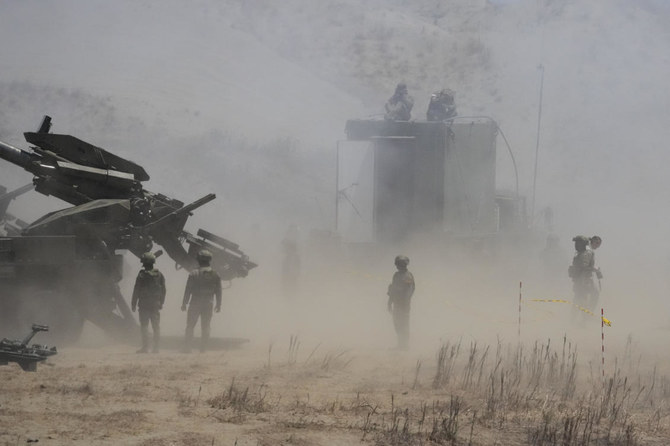
- Philippine President Ferdinand Marcos Jr.has ordered his military to shift its focus to external defense from decades-long domestic anti-insurgency operations
Military officials and diplomats from several countries, along with journalists, watched the display of firepower from a hilltop along a sandy coast in Laoag City on Wednesday in Ilocos Norte, Philippine President Ferdinand Marcos Jr.’s northern home province.
More than 16,000 military personnel from the United States and the Philippines, backed by a few hundred Australian troops and military observers from 14 countries were participating in annual combat-readiness drills called Balikatan, Tagalog for shoulder-to-shoulder, which started on April 22 and will end on Friday.
It’s the latest indication of how the United States and the Philippines have bolstered a defense treaty alliance that started in the 1950s.
Marcos has ordered his military to shift its focus to external defense from decades-long domestic anti-insurgency operations as China’s increasingly aggressive actions in the South China Sea become a top concern. That strategic shift dovetails with the efforts of President Joe Biden and his administration to reinforce an arc of alliances in the Indo-Pacific region to counter China.
China has angered the Philippines by repeatedly harassing its navy and coast guard ships with the use of powerful water cannons, a military-grade laser, blocking movements and other dangerous maneuvers in the high seas near two disputed South China Sea shoals that have led to minor collisions. Those have caused several injuries to Filipino navy personnel and damaged supply boats.
“We’re under the gun,” Philippine ambassador to Washington Jose Romualdez told The Associated Press in a telephone interview.
“We don’t have the wherewithal to be able to fight all of this bullying coming from China so where else will we go?” Romualdez asked. “We went to the right party which is the United States and those that believe in what the US is doing.”
China has accused the Philippines of setting off the hostilities in the disputed waters by encroaching into what it says are its offshore territories, demarcated by 10 dashes on a map. This has often prompted the Chinese coast guard and navy to take steps to expel Philippine coast guard and other vessels from that area. The Philippines, backed by the US and its allies and security partners, has repeatedly cited a 2016 international arbitration ruling based on the United Nations Convention of the Law of the Sea that invalidated China’s claim over virtually the entire South China Sea on historical grounds.
China did not participate in the arbitration complaint filed by the Philippines in 2013, rejected the ruling, and continues to defy it.
After an hour of the combat-readiness drills, black smoke started to billow from the stern of the mock enemy ship that was struck by missile fire and it started to sink ,as shown on a monitor watched by foreign military guests and journalists. US and Philippine warplanes later dropped bombs on the BRP Lake Caliraya, the target ship, which was made in China but decommissioned by the Philippine navy in 2020 due to mechanical and electrical issues, according to Philippine military officials.
Philippine military officials said the maneuvers would bolster the country’s coastal defense and disaster-response capabilities and claimed they were not aimed at any country. China has opposed military drills involving US forces in the region as well as increasing US military deployments, which it warned would ratchet up tensions and hamper regional stability and peace.
Washington and Beijing have been on a collision course over China’s increasingly assertive actions to defend its vast territorial claims in the South China Sea, and Beijing’s stated goal of annexing Taiwan, by force if necessary.
In February last year, Marcos approved a wider US military presence in the Philippines by allowing rotating groups of American military forces to stay in four more Philippine military camps. That was a sharp turnaround from his predecessor Rodrigo Duterte, who feared that a larger American military footprint could antagonize Beijing.
China strongly opposed the move, which would allow US forces to establish staging grounds and surveillance posts in the northern Philippines across the sea from Taiwan, and in western Philippine provinces facing the South China Sea.
China has warned that a deepening security alliance between Washington and Manila and their ongoing military drills should not harm its security and territorial interests or interfere in the territorial disputes. The Philippines countered that it has the right to defend its sovereignty and territorial interests.
“An alliance is very important to show China that you may have all the ships that you have, but we have a lot of firepower to sink all of them,” Romualdez said.
US paused bomb shipment to Israel to signal concerns over Rafah invasion, official says
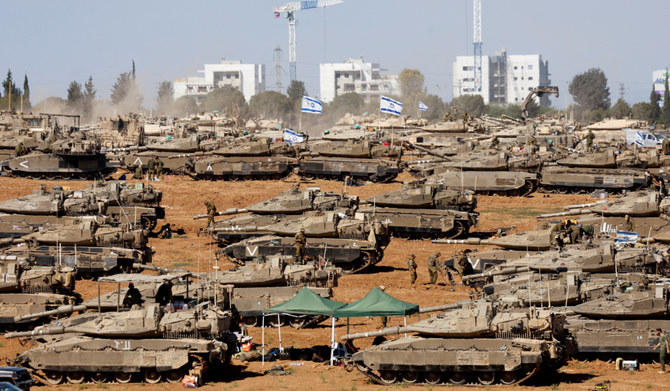
- Israel has killed more than 34,700 Palestinians in Gaza, mostly women and children, according to the health ministry in the Hamas-run territory
- The State Department is separately considering whether to approve the continued transfer of Joint Direct Attack Munition kits, which place precision guidance systems onto bombs, to Israel, but the review didn’t pertain to imminent shipments
WASHINGTON: The US paused a shipment of bombs to Israel last week over concerns that Israel was approaching a decision on launching a full-scale assault on the southern Gaza city of Rafah against the wishes of the US, a senior administration official said Tuesday.
The shipment was supposed to consist of 1,800 2,000-pound bombs and 1,700 500-pound bombs, according to the official, who spoke on the condition of anonymity to discuss the sensitive matter, with the focus of US concern being the larger explosives and how they could be used in a dense urban setting. More than 1 million civilians are sheltering in Rafah after evacuating other parts of Gaza amid Israel’s war on Hamas, which came after the militant group’s deadly attack on Israel on Oct. 7.
President Joe Biden’s administration in April began reviewing future transfers of military assistance to Israel as Prime Minister Benjamin Netanyahu’s government appeared to move closer toward an invasion of Rafah, despite months of opposition from the White House. The official said the decision to pause the shipment was made last week and no final decision had been made yet on whether to proceed with the shipment at a later date.
The State Department is separately considering whether to approve the continued transfer of Joint Direct Attack Munition kits, which place precision guidance systems onto bombs, to Israel, but the review didn’t pertain to imminent shipments.
Some colleges that had been permissive of pro-Palestinian protests begin taking a tougher stance
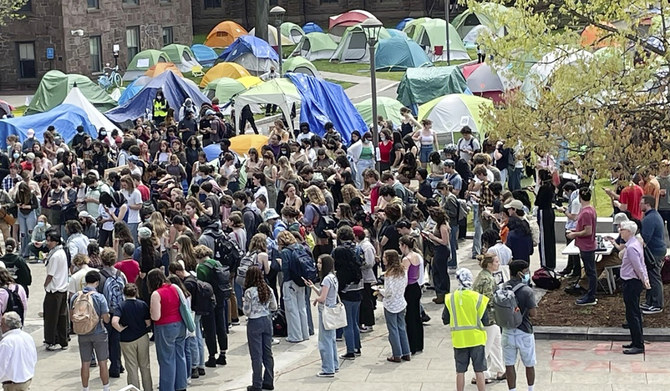
- Tensions have continued to ratchet up in standoffs with protesters on campuses across the US — and increasingly, in Europe — nearly three weeks into a movement launched by a protest at Columbia University
- Israel has killed more than 34,700 Palestinians in Gaza, mostly women and children, according to the health ministry in the Hamas-run territory
CHICAGO: Police cleared a pro-Palestinian tent encampment at the University of Chicago on Tuesday after administrators who had initially adopted a permissive approach said the protest had crossed a line and caused growing concerns about safety.
University President Paul Alivizatos acknowledged the school’s role as a protector of freedom of speech after officers in riot gear blocked access to the school’s Quad but also took an enough-is-enough stance.
“The university remains a place where dissenting voices have many avenues to express themselves, but we cannot enable an environment where the expression of some dominates and disrupts the healthy functioning of the community for the rest,” Alivizatos wrote in a message to the university community.
Tensions have continued to ratchet up in standoffs with protesters on campuses across the US — and increasingly, in Europe — nearly three weeks into a movement launched by a protest at Columbia University. Some colleges cracked down immediately on protests against the Israel-Hamas war. Among those that have tolerated the tent encampments, some have begun to lose patience and call in police over concerns about disruptions to campus life, safety and the involvement of nonstudents.
Since April 18, just over 2,600 people have been arrested on 50 campuses, figures based on AP reporting and statements from universities and law enforcement agencies.
But not all schools are taking that approach, with some letting protesters hold rallies and organize their encampments as they see fit.
The president of Wesleyan University, a liberal arts school in Connecticut, has commended the on-campus demonstration — which includes a pro-Palestinian tent encampment — as an act of political expression. The camp there has grown from about 20 tents a week ago to more than 100.
“The protesters’ cause is important — bringing attention to the killing of innocent people,” university President Michael Roth wrote to the campus community Thursday. “And we continue to make space for them to do so, as long as that space is not disruptive to campus operations.”
The Rhode Island School of Design, where students started occupying a building Monday, affirms students’ rights to freedom of speech and peaceful assembly and supports all members of the community, a spokesperson said. The school said President Crystal Williams spent more than five hours with the protesters that evening discussing their demands.
On Tuesday the school announced it was relocating classes that were scheduled to take place in the building. It was covered with posters reading “Free Palestine” and “Let Gaza Live,” and dove was drawn in colored chalk on the sidewalk.
Campuses have tried tactics from appeasement to threats of disciplinary action to resolve the protests and clear the way for commencements.
At the University of Chicago, hundreds of protesters gathered for at least eight days until administrators warned them Friday to leave or face removal. On Tuesday, law enforcement dismantled the encampment.
Officers later picked up a barricade erected to keep protesters out of the Quad and moved it toward the demonstrators, some of whom chanted, “Up, up with liberation. Down, down with occupation!” Police and protesters pushed back and forth along the barricade as the officers moved to reestablish control.
Officials at the University of North Carolina, Chapel Hill, told deans and department chairs Monday that some students have been informed by instructors opposing the suspension of student protesters that they will withhold grades.
The school provost’s office said it will support “sanctions for any instructor who is found to have improperly withheld grades.”
At the Massachusetts Institute of Technology, protesters were given a deadline to voluntarily leave or face suspension. Many left, according to an MIT spokesperson, who said protesters breached fencing after the arrival of demonstrators from outside the university. On Monday night, dozens remained at the encampment in a calmer atmosphere.
MIT officials said the following day that dozens of interim suspensions and discipline committee referrals were in process, actions taken to ensure the “safety of our community.”
Sam Ihns, a graduate student studying mechanical engineering and a member of MIT Jews for a Ceasefire, said the group has been there for two weeks and is calling for an end to the killing in Gaza.
“Specifically, our encampment is protesting MIT’s direct research ties to the Israeli Ministry of Defense,” he said.
Many protesters want schools to divest from companies that do business with Israel or otherwise contribute to the war effort. Others simply want to call attention to the deaths in Gaza and for the war to end.
Wesleyan senior Uday Narayanan said students there are prepared to protest through the summer if that’s what it takes for their demands to be met.
“Our tuition dollars are still going toward the brutalization of Palestinians,” the 21-year-old physics major said. “So, ultimately, even though our president has said, ‘Oh, I’m not going to call the cops. Oh, I’m not going to beat up students,’ that’s still not enough, and that’s not the bare minimum for us.”
And as Wesleyan’s May 26 commencement approaches, some protesters fear they will be forcibly removed from the center of campus, adjacent to the field where the ceremony is to take place.
“The longer we are here, the more that their facade of laid back, hands off is falling away,” said Batya Kline, a 22-year-old graduate student. “We know that the university does not want us here, and we know that they can change their pace at the drop of a hat without letting us know.”
Frank Straub, senior director of violence prevention at nonprofit advocacy organization Safe and Sound Schools, said these and past protests have shown the need for early dialogue among the university, police and protesters to establish ground rules.
Straub said Wesleyan, for example, needs to have conversations about commencement and where protesters can be, and should make sure a plan is in place to respond, should protesters want to get arrested, so that can be done without violence.
“By their nature, protests are adversarial, but I think we can have controlled adversity,” he added. “And I think the more campus officials are engaged with the protesters and the more police are included in those conversations, that’s critically important.”
The protests stem from the conflict that started Oct. 7 when Hamas militants attacked southern Israel, killing about 1,200 people, mostly civilians, and taking roughly 250 hostages.
Vowing to destroy Hamas, Israel launched an offensive in Gaza that has killed more than 34,500 Palestinians, about two-thirds of them women and children, according to the Health Ministry in the Hamas-ruled territory. Israeli strikes have devastated the enclave and displaced most of its inhabitants.
Two suspected Kashmir rebels killed in clash with Indian forces
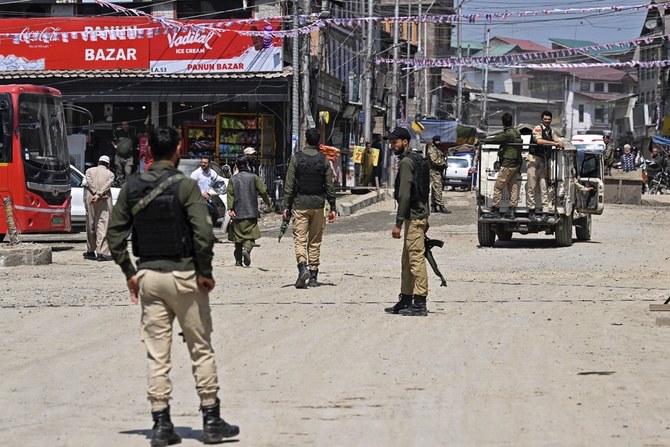
SRINAGAR, India: Two suspected rebels were killed in Indian-administered Kashmir during a firefight with soldiers, police said Tuesday, at a time when campaigning for national elections is underway in the disputed territory.
Scores of soldiers besieged a residential area in southern Kulgam district, some 70 kilometers (43 miles) from Kashmir’s biggest city Srinagar, on Monday after armed militants were suspected to be present inside a house.
Two bodies of the suspected rebels “were recovered so far” from the site, police said in a statement posted Tuesday on social media platform X.
Images from the area showed smoke billowing from a house after it caught fire during the skirmish.
Kashmir has been divided between India and Pakistan since their independence in 1947, with both claiming the Himalayan territory in full.
Rebel groups opposed to Indian rule have for decades waged an insurgency in Indian-controlled Kashmir, demanding either independence or a merger with Pakistan.
The conflict has left tens of thousands of civilians, soldiers and militants dead.
Violence and anti-India protests have drastically reduced since 2019, when Prime Minister Narendra Modi’s government canceled the Muslim majority region’s limited autonomy.
But clashes between security forces and rebel groups have increased since voting began last month in India’s six-week election.
Three suspected rebels were killed and a police officer and three soldiers wounded in three separate clashes across the territory in April.
Militants ambushed a military convoy in Kashmir’s south on Sunday, killing one Indian air force corporal and wounding four other troops.
Israeli Rafah offensive would break international law, says UK deputy foreign minister

- Andrew Mitchell warns a ground invasion could strengthen Hamas, in comments viewed as attempt to get Israel to sign up for peace deal accepted by Hamas on Monday
- UN chief Antonio Guterres urges Israel to ‘stop any escalation’ after tanks enter Rafah and army takes control of crossing on the border with Egypt
LONDON: An Israeli ground offensive in Rafah would contravene international humanitarian law and would not succeed in removing Hamas from power in Gaza or eradicating the organization, Britain’s deputy foreign minister warned on Tuesday.
Andrew Mitchell said Israeli authorities had failed to present a military plan that complies with international law, and that entering Rafah, which has become the final refuge for more than a million people displaced by fighting in other parts of Gaza, could strengthen, not weaken, Hamas.
However, he stopped short of saying what international consequences, if any, Israel might face if it proceeds.
Mitchell reiterated the UK government’s desire for a permanent, sustained ceasefire in Gaza. His comments, which followed a similar statement by authorities in France on Monday, were seen as an attempt to put pressure on Israel to sign up for a provisional, three-stage peace deal that was accepted by Hamas on Monday, The Guardian newspaper reported on Tuesday.
Israeli minister Benny Gantz has said the peace proposal did not “correspond to the dialogue that has taken place so far with the mediators and has significant gaps.”
Mitchell also echoed calls from the UN for Israel to end a renewed block on humanitarian aid entering Gaza. Also on Tuesday, UN Secretary-General Antonio Guterres called for border crossings to be reopened “immediately” so that essential aid can be delivered to Gaza. He urged Israeli authorities to “stop any escalation” after they sent tanks into Rafah early on Tuesday and the army took control of the nearby crossing on the border with Egypt.
“Things are moving in the wrong direction. I am disturbed and distressed by the renewed military activity in Rafah by the Israel Defense Forces,” Guterres said.
International pressure has been building on Israel over the potentially devastating consequences of a threatened ground invasion of Rafah, where the UN estimates about 1.4 million Palestinians are sheltering.
EU foreign policy chief Josep Borrell said such action could cause many “civilian casualties.” White House spokesperson John Kirby said that Israel told Washington its operation in Rafah “was limited and designed to cut off Hamas’s ability to smuggle weapons” into Gaza.
Egypt has urged Israeli authorities to “exercise the utmost restraint.” The Organization for Islamic Cooperation condemned Israel’s “criminal aggression.”


